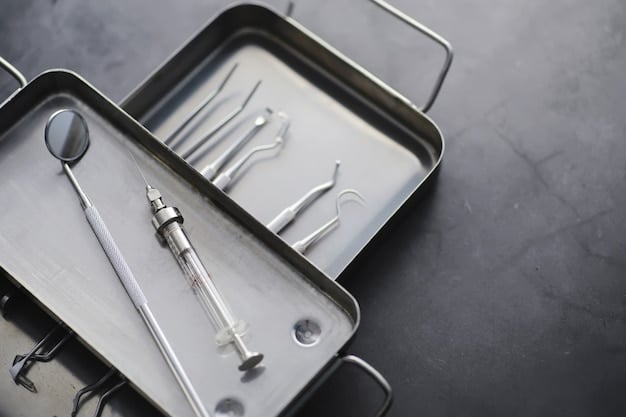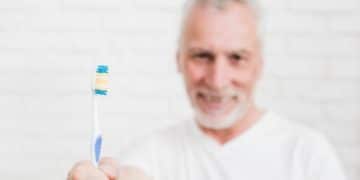Dental Checkups for Seniors: Oral Health After 65

Regular dental checkups are crucial for seniors to maintain optimal oral health, prevent age-related diseases, and preserve overall well-being, directly influencing nutrition, comfort, and systemic health outcomes.
As we age, our bodies undergo numerous changes, and our oral health is no exception. For individuals over 65, the landscape of dental care shifts considerably, making the importance of regular dental checkups for seniors: maintaining oral health after 65 a topic of critical discussion. It is not merely about preserving a bright smile; it is fundamentally about safeguarding overall health and quality of life.
Why Dental Health Becomes Crucial After 65
Entering the golden years often brings a focus on managing chronic conditions, maintaining mobility, and ensuring general well-being. However, oral health often gets overlooked, mistakenly perceived as a separate entity from systemic health. In reality, the mouth serves as a gateway to the rest of the body, and its condition can significantly impact overall health, particularly for seniors.
The aging process affects oral tissues and teeth in various ways. Years of wear and tear, combined with lifestyle factors and the accumulation of medical conditions, can lead to a heightened risk of oral diseases. A proactive approach to dental care becomes not just beneficial but essential for preventing more serious health complications.
Understanding Age-Related Oral Changes
Several physiological changes contribute to increased dental vulnerability in older adults. These changes are natural but demand diligent monitoring and care to prevent adverse outcomes. Understanding these shifts is the first step toward effective oral health management.
- Gum Recession: Gums often recede with age, exposing the roots of teeth. This can lead to increased sensitivity, higher risk of root decay, and periodontal disease.
- Dry Mouth (Xerostomia): A common side effect of many medications used by seniors, dry mouth significantly reduces saliva production. Saliva plays a vital role in washing away food particles and neutralizing acids, protecting against decay.
- Increased Risk of Cavities: Due to gum recession and dry mouth, seniors are more prone to root cavities, which can be challenging to detect and treat if not caught early.
- Bone Density Loss: Osteoporosis and similar conditions can affect jawbone density, potentially leading to tooth loss and complications with dentures or implants.
These age-related changes underscore why routine dental checkups are not a luxury but a necessity. Dentists can identify these issues early, offering tailored advice and interventions that can mitigate their impact and preserve oral function.
The Systemic Links: Oral Health and Overall Well-Being in Seniors
The connection between oral health and general health is particularly pronounced in older adults. Conditions originating in the mouth can exacerbate existing chronic diseases or even contribute to the development of new ones. This interconnectedness emphasizes the holistic nature of senior care.
Poor oral hygiene and untreated dental infections can have far-reaching consequences beyond the oral cavity. Regular dental visits enable early detection and intervention, breaking the cycle of oral-systemic disease progression. It’s about more than just teeth; it’s about life quality.
Oral Infections and Chronic Diseases
Periodontal disease, a common chronic inflammatory condition affecting the gums and supporting bone, has been strongly linked to various systemic health issues. For seniors, managing this connection is paramount.
- Cardiovascular Disease: Research suggests a correlation between periodontal disease and an increased risk of heart disease, stroke, and bacterial endocarditis. Oral bacteria can enter the bloodstream, contributing to plaque buildup in arteries.
- Diabetes: There’s a bidirectional relationship between diabetes and periodontal disease. Uncontrolled diabetes makes individuals more susceptible to gum disease, and severe gum disease can make blood sugar control more difficult.
- Pneumonia: Aspiration pneumonia, a serious lung infection, is more common in seniors with poor oral hygiene. Bacteria from the mouth can be inhaled into the lungs, leading to infection.
- Rheumatoid Arthritis: Some studies indicate a link between periodontal disease and rheumatoid arthritis, suggesting that chronic inflammation in the mouth might contribute to systemic inflammatory responses.
These connections highlight the critical role regular dental care plays in preventing and managing chronic systemic conditions. For seniors managing multiple health challenges, integrating oral health into overall medical care is a strategic imperative.

Preventive Care: Your Best Defense Against Senior Oral Health Challenges
Preventive care is the cornerstone of effective oral health management at any age, but it gains particular importance for seniors. Regular dental checkups are not solely about addressing existing problems; they are primarily about preventing them from occurring or escalating.
A comprehensive preventive strategy encompasses professional cleanings, early detection of issues, and personalized advice on home care. This proactive approach can significantly reduce the incidence of cavities, gum disease, and other common oral problems, saving time, discomfort, and expense in the long run.
Professional Cleanings and Examinations
Even with meticulous home care, some plaque and tartar buildup are inevitable. Professional cleanings remove these hardened deposits, preventing them from causing inflammation and decay. Dental examinations, on the other hand, go beyond mere cleaning, delving deeper into diagnostic aspects.
During these checkups, dentists perform thorough examinations of teeth, gums, and oral soft tissues. They actively look for early signs of decay, gum disease, and even oral cancer. The ability to detect these conditions in their nascent stages often leads to more straightforward and successful treatments. Dental X-rays, often taken periodically, provide insights into underlying bone health and hidden issues that aren’t visible externally.
Timely intervention based on these examinations can prevent minor problems from progressing into significant health concerns. For example, a small cavity detected early can be easily filled, avoiding the need for more complex procedures like root canals or extractions later on.
Personalized Home Care Guidance
While professional care is vital, daily home care routines are equally, if not more, important for maintaining oral health. Dentists and dental hygienists offer tailored advice to seniors, taking into account their specific needs and limitations.
- Effective Brushing Techniques: Guidance on proper brushing methods, including selecting the right toothbrush (e.g., electric toothbrushes for those with dexterity issues) and toothpaste (e.g., fluoride toothpaste), is crucial.
- Interdental Cleaning: Instruction on using dental floss, interdental brushes, or water flossers to clean between teeth, where traditional brushing cannot reach.
- Denture Care: For those with dentures, proper cleaning and maintenance instructions are provided to prevent oral infections and ensure a comfortable fit.
- Managing Dry Mouth: Recommendations for over-the-counter saliva substitutes, increasing water intake, and avoiding certain foods and beverages that exacerbate dry mouth.
This personalized guidance empowers seniors to take an active role in their oral health management, reinforcing the benefits of professional checkups with daily preventive practices.
Addressing Unique Dental Concerns of Seniors
Seniors face a unique constellation of dental challenges that often require specialized attention. From managing existing restorations to dealing with tooth loss and the onset of new conditions, the dental landscape evolves significantly after 65. Regular checkups are the primary means to navigate these challenges effectively.
Understanding and proactively addressing these concerns can prevent discomfort, maintain functional chewing and speaking abilities, and ultimately enhance a senior’s overall quality of life. A dentist experienced in geriatric dentistry can provide invaluable insights and care.
Managing Existing Restorations and Appliances
Many seniors have a history of dental work, including fillings, crowns, bridges, and partial or complete dentures. These restorations, while durable, are not permanent and require ongoing monitoring. Over time, they can wear down, become loose, or develop issues that need attention.
Regular checkups allow dentists to assess the integrity of existing restorations. Loose fillings, cracked crowns, or ill-fitting dentures can lead to discomfort, trapped food particles, and increased risk of decay or gum irritation. Early detection means these issues can be addressed before they lead to more significant problems, such as infection or further tooth loss. For denture wearers, routine evaluations ensure the fit remains comfortable and does not cause sores or accelerated bone loss.
Dealing with Tooth Loss and Replacements
Tooth loss can significantly impact a senior’s ability to chew, speak, and maintain proper nutrition. While preventive care aims to preserve natural teeth, tooth loss can occur. Modern dentistry offers various solutions for tooth replacement, and regular checkups help determine the most suitable option and monitor their effectiveness.
- Dentures: Full or partial dentures replace missing teeth and surrounding tissues. Regular checkups ensure they fit properly and that the underlying gums and bone remain healthy.
- Dental Bridges: These fixed prosthetics bridge the gap created by one or more missing teeth, anchored to natural teeth or implants. Their stability and proper hygiene around them are checked during visits.
- Dental Implants: Often considered the gold standard for tooth replacement, implants provide a durable, long-term solution. Regular monitoring is crucial to ensure implant health and prevent peri-implantitis.
Discussing these options and managing existing replacements effectively ensures seniors can maintain optimal oral function and aesthetics, which are crucial for self-confidence and social interaction.

The Role of Nutrition and Hydration in Senior Oral Health
Beyond brushing and flossing, diet plays an indispensable role in maintaining oral health, particularly for seniors. What one eats and drinks directly influences the strength of teeth, the health of gums, and the overall oral environment. For individuals over 65, paying close attention to nutrition and hydration can be a powerful preventive measure.
A balanced diet supports not only oral health but also the body’s overall ability to fight infections and maintain tissue integrity. Regular dental checkups provide an opportunity for personalized dietary advice, helping seniors make informed choices that benefit their mouths and bodies.
Impact of Diet on Teeth and Gums
Certain foods can significantly increase the risk of dental problems, while others can bolster oral defenses. Understanding these dynamics is key to proactive oral care at home.
- Limiting Sugary and Acidic Foods: Items high in sugar and acidity promote tooth decay by providing fuel for bacteria and eroding enamel. This includes sodas, candies, and highly processed snacks.
- Nutrient-Rich Foods: A diet rich in fruits, vegetables, lean proteins, and dairy products (or fortified alternatives) provides essential vitamins and minerals like calcium, vitamin D, and phosphorus, which are crucial for strong teeth and bones.
- Fiber-Rich Foods: Apples, carrots, and other fibrous foods act as natural cleansers, stimulating saliva flow and helping to scrub away food particles from tooth surfaces.
A dentist can offer guidance on dietary adjustments that support oral health, taking into account any dietary restrictions or medical conditions. These discussions during checkups are crucial for tailoring advice to individual needs.
Hydration and Saliva Production
Adequate hydration is critical for maintaining healthy saliva flow, which is a natural defense mechanism for the mouth. Saliva helps wash away food debris, neutralize acids, and provides minerals that repair early enamel damage.
For seniors, dry mouth (xerostomia) is a common issue, often caused by medications or medical conditions. Reduced saliva flow dramatically increases the risk of cavities and gum disease. Dentists can provide strategies to combat dry mouth, which might include:
- Increasing Water Intake: Encouraging frequent sips of water throughout the day.
- Using Saliva Substitutes: Recommending over-the-counter products designed to moisten the mouth.
- Avoiding Dehydrating Substances: Advising against excessive caffeine, alcohol, and tobacco, which can dry out the mouth.
Addressing hydration and dry mouth proactively during regular dental visits can significantly reduce the risk of associated oral health problems and improve overall comfort.
Navigating Dental Care Costs and Accessibility for Seniors
One of the primary barriers to consistent dental care for seniors in the US can be the perceived cost and accessibility of services. Unlike medical care, routine dental care is often not fully covered by Medicare, leaving many to pay out-of-pocket or rely on supplemental insurance plans. Addressing these concerns is crucial to ensuring seniors receive the care they need.
Understanding available options and actively seeking information can mitigate financial and logistical hurdles. Dental professionals and community resources often play a significant role in guiding seniors through these complexities, making regular checkups a more attainable reality.
Understanding Insurance and Payment Options
Navigating the complex landscape of dental insurance can be daunting. While Original Medicare generally does not cover routine dental care, there are other avenues for seniors:
- Medicare Advantage Plans (Part C): Many Medicare Advantage plans offer dental benefits, often including preventive care like cleanings and X-rays, and sometimes partial coverage for restorative procedures. It’s essential to compare plans as coverage varies widely.
- Medicaid: In some states, Medicaid programs may offer limited dental benefits for adults, including seniors. Eligibility and scope of coverage differ by state.
- Private Dental Insurance: Seniors can purchase private dental insurance plans specifically designed to cover a range of dental services. These plans often have annual maximums and waiting periods.
- Dental Discount Plans: These are not insurance but offer reduced rates on dental services from participating providers for an annual membership fee.
- Payment Plans and Sliding Scales: Many dental practices offer in-house payment plans, and some community clinics may offer services on a sliding scale based on income.
During dental checkups, discussions about payment options and insurance can be initiated, allowing seniors to explore the most suitable financial arrangements for their care.
Finding Accessible and Senior-Friendly Dental Practices
Accessibility is another vital factor, especially for seniors with mobility challenges or those living in rural areas. Finding a dental practice that is physically accessible and empathetic to the needs of older patients is paramount.
When searching for a dentist, seniors and their caregivers might consider:
- Location and Transportation: Proximity to home and ease of public transportation or ride-sharing services.
- Physical Accessibility: Practices with ramps, elevators, spacious waiting areas, and accessible restrooms.
- Geriatric Dentistry Expertise: Dentists who have experience or specialized training in treating older adults understand the unique oral health needs and potential complexities.
- Communication Style: A dental team that communicates clearly, patiently, and respectfully, ensuring the senior understands their treatment options and care instructions.
Online directories, local senior centers, and recommendations from general practitioners can be valuable resources for finding appropriate dental care. Ensuring access to regular checkups empowers seniors to maintain their oral health without undue stress or burden.
Empowering Seniors: Taking an Active Role in Their Oral Health Journey
Ultimately, maintaining optimal oral health after 65 is a collaborative effort between seniors, their families or caregivers, and dental professionals. While professional checkups are foundational, empowering seniors to take an active role in their daily oral care and decision-making is equally important.
This empowerment fosters independence, enhances self-efficacy, and directly contributes to a better quality of life. By understanding the importance of their role, seniors can become advocates for their own oral health, leading to more consistent and effective care.
Self-Monitoring and Communication
Seniors and their caregivers should be encouraged to routinely self-monitor for any changes in their oral cavity. Early detection of symptoms can prompt timely professional intervention, preventing minor issues from escalating. This includes observing for:
- Persistent Sores or Lesions: Any mouth sores that do not heal within two weeks should be reported.
- Changes in Gums: Swelling, redness, bleeding, or tenderness of the gums.
- Tooth Sensitivity or Pain: New or increased sensitivity to hot, cold, or pressure.
- Difficulty Chewing or Swallowing: Any new challenges with eating or drinking.
- Changes in Denture Fit: Loose dentures that suddenly become uncomfortable or cause sores.
Open and honest communication with dental providers is crucial. Seniors should feel comfortable discussing any concerns, changes in health conditions, or medications they are taking, as these can all impact oral health.
Advocacy and Support Systems
For some seniors, especially those with cognitive or physical limitations, a strong support system is invaluable. Family members or caregivers can act as advocates, ensuring appointments are kept, medications are managed, and daily oral hygiene routines are followed.
Advocacy also extends to navigating the healthcare system, understanding insurance benefits, and seeking out resources for low-cost or accessible dental care. Programs offered by senior centers, local health departments, or dental schools can provide additional support and information.
By fostering an environment of awareness, proactive care, and robust support, the journey of maintaining oral health after 65 becomes more manageable and effective. Regular dental checkups serve as the anchor for this comprehensive approach, ensuring that seniors can enjoy healthy smiles and overall well-being throughout their golden years.
| Key Point | Brief Description |
|---|---|
| 🦷 Dental Changes | Aging leads to gum recession, dry mouth, and increased cavity risk, necessitating specialized care. |
| ❤️ Systemic Links | Poor oral health links to heart disease, diabetes, and pneumonia, emphasizing holistic care. |
| 🛡️ Preventive Care | Regular cleanings, exams, and personalized home care are crucial for preventing major issues. |
| 💰 Cost & Access | Seniors must explore Medicare Advantage, Medicaid, and private options while seeking accessible clinics. |
Frequently Asked Questions About Senior Dental Health
Seniors face a higher risk of gum disease, root decay, and dry mouth due to age-related changes and medications. Regular checkups allow for early detection and prevention of these specific issues, which can impact overall systemic health more significantly in older populations.
Most dentists recommend seniors visit at least twice a year for checkups and cleanings. However, individuals with chronic health conditions, extensive dental work, or specific oral health concerns might benefit from more frequent visits, as advised by their dentist.
Original Medicare (Parts A and B) generally does not cover routine dental services like cleanings, fillings, or dentures. Many seniors opt for Medicare Advantage (Part C) plans, which often include some level of dental benefits, or purchase separate private dental insurance plans.
Seniors should brush twice daily with fluoride toothpaste, floss daily, and maintain a balanced diet. Using an electric toothbrush can be helpful for those with dexterity issues. Addressing dry mouth symptoms and regular self-monitoring for oral changes are also vital for home care.
Poor oral health, especially periodontal disease, is linked to systemic conditions like heart disease, diabetes, and pneumonia. Bacteria from oral infections can enter the bloodstream, affecting other parts of the body and exacerbating existing chronic health issues, highlighting the importance of integrated care.
Conclusion
The journey of aging is accompanied by a unique set of oral health considerations, making the commitment to regular dental checkups more vital than ever for those over 65. These routine visits extend far beyond preventative cleanings, serving as critical opportunities for early detection of age-related dental issues, management of existing conditions, and crucial screening for serious health concerns like oral cancer. By prioritizing these appointments, seniors are not just investing in their smiles; they are actively safeguarding their overall physical health, ensuring better nutrition, comfort, and an enhanced quality of life. The collaborative effort between seniors, their families, and dedicated dental professionals ensures a holistic approach to well-being, proving that a healthy mouth is indeed a cornerstone of healthy aging.





